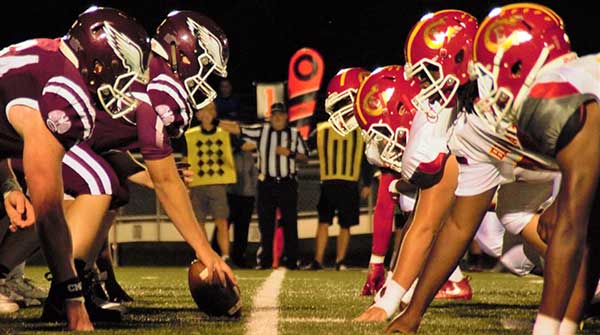We need to seriously consider changes that can improve the health and general well-being of football players
 I’m no football hater. I genuinely enjoy watching the game. However, I am deeply concerned about the undeniable dangers of the game – especially for our children who are playing before their brains are fully developed.
I’m no football hater. I genuinely enjoy watching the game. However, I am deeply concerned about the undeniable dangers of the game – especially for our children who are playing before their brains are fully developed.
The disturbing scene that played out when Bills safety Damar Hamlin suffered cardiac arrest after making a tackle in the Buffalo Bills vs. Cincinnati Bengals game has served to bring the nation’s attention to the health dangers of playing this violent sport.
While doctors have yet to determine what caused Hamlin’s heart to stop, his injury, in and of itself, is not reason enough to make significant changes to how we play football.
However, when the health dangers of football are looked at as a whole, it becomes clear that changes are needed. There are numerous possibilities, but let’s start with these four:
 Photo by Muyuan Ma |
| Related Stories |
| Dartmouth shows how football can be made safer
|
| Why can’t football make brain health a priority?
|
| Playing football is one scary game of Russian roulette
|
Guaranteed Contracts for NFL Players. Unlike the NBA and MLB, most NFL contracts aren’t guaranteed. Despite playing the most dangerous professional sport by far, NFL players like Hamlin don’t have the financial protection that athletes in other pro sports have in case of injury. In addition to the lack of guaranteed contracts, the NFL pension and healthcare plans also take a backseat to the NBA and MLB.
NFL players have a life expectancy of only 59.6 years. Moreover, the number of former NFL players between the ages of 30 and 49 who have received diagnoses of dementia, Alzheimer’s, or other memory-related diseases is 19 times the national average for that age group. Also, one study revealed that 99 percent of the donated brains of former NFL players have the progressive degenerative brain disease chronic traumatic encephalopathy (CTE).
NFL owners, whose franchise values and profits have skyrocketed in recent years, need to step up and provide players guaranteed contracts and a better pension and post-retirement healthcare plan.
Eliminate Live Tackling at College and High School Practices. Every college and high school football program should adopt the Dartmouth policy of eliminating tackling from all practices. Injuries at Dartmouth, including concussions, have dropped significantly since this policy was implemented.
Instead of tackling teammates, Dartmouth players tackle inanimate objects, not people. They use various dummies, including a robotic moving dummy, called the “mobile virtual player,” in practice.
Dartmouth has been very competitive on the field since the change. They’ve won three Ivy League championships and have been ranked nationally, offensively and defensively, during several seasons since head coach Buddy Teevens switched to a no-contact policy 12 years ago.
Require High Schools That Sponsor Football to Have Certified Athletic Trainers. This is important because schools with full-time trainers do a better job of identifying concussed athletes than schools without full-time trainers. Also, athletes at schools without full-time trainers dangerously return to play sooner than athletes with full-time trainers.
If schools are going to spend money to fund football and other contact sports, they also need to find the money to fund a full-time athletic trainer who is nearby for practices and games and, ideally, a doctor who’s on the sideline for games.
Ban Tackle Football for Kids 12 and Under. The developing brains of pre-teens are more vulnerable than those of adults. We don’t allow kids to partake in dangerous activities like smoking, so why do we allow them to play a dangerous sport like tackle football?
According to the U.S. Centers for Disease Control and Prevention, youth tackle football players in the U.S. experience a median of 378 head impacts per season compared to eight for flag football players. The more than 2.8 million children ages six to 14 playing tackle football are 15 times more likely to sustain blows to the head than flag football players.
Football isn’t going away anytime soon. But that doesn’t mean we shouldn’t seriously consider changes that can improve the health and general well-being of the game’s participants.
Avoidance behaviour simply can’t be an option.
Ken Reed is sports policy director for League of Fans (leagueoffans.org), a sports reform project. He is the author of three books on sports issues: How We Can Save Sports; Ego vs. Soul in Sports; and The Sports Reformers; and a children’s sports book titled Sara’s Big Challenge.
For interview requests, click here.
The opinions expressed by our columnists and contributors are theirs alone and do not inherently or expressly reflect the views of our publication.
© Troy Media
Troy Media is an editorial content provider to media outlets and its own hosted community news outlets across Canada.
